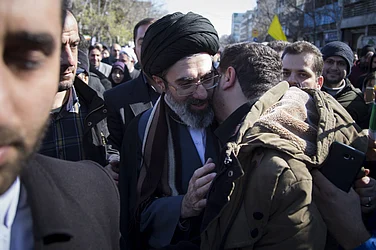Nepal’s apex court on Wednesday ordered the release of the infamous serial killer, Charles Sobhraj, on medical and humanitarian grounds, who was serving life sentence in a Nepali prison for 19 years, and has also been a Tihar jail inmate for nearly two decades on charges of multiple notorious killings.
“Keeping him in the prison continuously is not in line with the prisoner’s human rights,” read a copy of the verdict seen by the AFP news agency. “If there are not any other pending cases against him to keep him in the prison, this court orders his release by today and … the return to his country within 15 days,” it added.
Sobhraj, 78, was the protagonist portrayed in a 2020 Netflix and BBC produced web series ‘The Serpent,’ as he was known for his ability to disguise himself and assume fake identities to evade justice. The French Embassy had approached the Nepalese government to secure Sobhraj’s release, and he is expected to be freed and deported to his home country France as early as Thursday. Here’s what we know about Charles Sobhraj, the ‘Bikini killer:’
Early Life
Sobhraj is part-Indian and was born in then-French occupied Saigon region to an Indian businessman and a Vietnamese shop assistant. His biological father however, never acknowledged paternity and it is said that he resented his father’s abandonment.
He later moved to France after his mother married a French soldier. Having had a troubled childhood, he took to petty crimes early on and was regularly moved in and out of jail since his teenage years.
How he came to be known as the ‘Bikini KIller’
Sobhraj became infamously renowned as the bikini killer after his first victim was found murdered in 1975 on a beach in Pattaya wearing a bikini.
He has admittedly killed more than 20 people, between 1972 and 1982, in which the victims were drugged, strangled, beaten or burned. He routinely targeted Western backpackers, usually women, across the “hippie trail” in India and Thailand.
He befriended his victims, and was known to be suave and cunning. He would usually spike their drinks and poison them to death, and at times even misused his male victims' passports to illegally travel across countries.
He even married his lawyer’s daughter, Nihita Biswas, who is 44-years younger to him while he was lodged in Nepali jail.
Successive arrests and life sentences
Through his initial killings, Sobhraj was arrested multiple times but managed to evade punishment by fleeing or bribing his way out. He was finally sentenced to ten years imprisonment in India’s Tihar jail in 1976, after he poisoned some French students to death. He befriended the French nationals after convincing them to hire him as a tour guide.
JP Naithani, who was then deputy superintendent at Tihar jail, wrote about his experience meeting Sobhraj in The Indian Express, “I have seen him in different modes of life inside jail: fighting his legal battle in the local courts, dealing with journalists and lawyers, and working on his book Serpentine — which turned out to be a bestseller — and always charming his female visitors. He had a fair number of them, some even from overseas, who would come confessing eternal love. Some of them wanted to marry him and even applied to the courts for permission. Such was his persona.”
In 1986, when Sobhraj was about to be released after serving his prison term, he was wanted in Thailand for murdering six people. Against this backdrop, Sobhraj managed to escape from Tihar jail after serving spiked “birthday sweets” to prison officials but was later apprehended in Goa. A BBC article describes this as a plot by Sobhraj to avoid being extradited to Bangkok, where he would’ve been given the death penalty.
By the time he was released from Tihar in 1997, the 20 year time-frame for him to be tried in Bangkok had lapsed.
In 2014, he also admitted to have worked as an arms dealer for the Taliban, having befriended terror mastermind Masood Azhar during his time in Tihar jail.
Arrested in Kathmandu
After his release from Tihar, Sobhraj went to France and resurfaced in Kathmandu only in 2003, where he was arrested for murdering two foreign travelers in 1975 – an American woman, Connie Jo Bronzich, and her Canadian backpacker friend, Laurent Carriere.
The serial killer was convicted in two separate trials for two life sentences (20 years each as per Nepalese law), most recently in 2014 for murdering Carriere. Sobhraj’s legal team had last year approached the Supreme Court seeking his early release on grounds of old age, but the Nepal government had opposed the same.
“There is no provision in the law for the offender to be exempted due to age, disease, or other reasons. Although imprisonment can be reduced, it cannot be reduced in cases of murder, smuggling, rapeescape etc..” read the written reply of the government.
Granted release on grounds of good behavior, medical condition
Sobhraj underwent a five-hour heart operation in 2017, and was in need of an open heart surgery. His release order on Wednesday was in keeping with a Nepalese law that allows inmates who have shown good character and completed 75% of their jail term to be prematurely released on compassionate grounds, reported Al Jazeera.






















